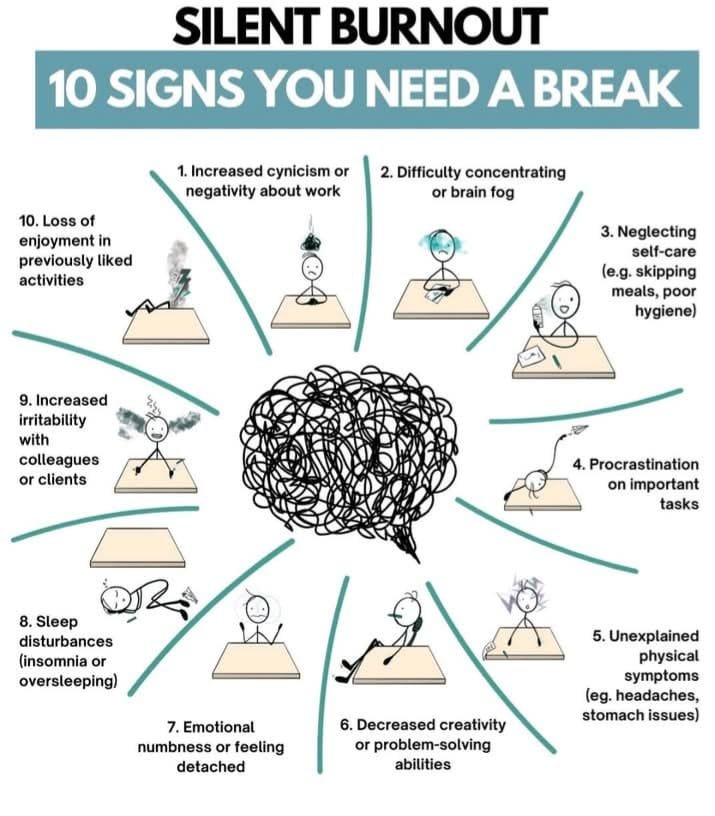
Burnout doesn’t always announce itself with a dramatic breakdown—it often creeps in silently, eroding your productivity and well-being. In 2025, project managers face unique pressures, from managing AI-driven workflows to leading distributed teams. The image above highlights 10 signs of silent burnout that signal you need a break. Let’s explore each sign, understand its impact, and discover practical strategies to reclaim your balance and lead effectively. Recognizing these signs early can prevent long-term damage to your health and career.
1. Increased Cynicism or Negativity About Work
Feeling cynical or negative about tasks you once enjoyed? This is a classic sign of burnout. For project managers, constant deadlines and stakeholder demands can turn enthusiasm into frustration. A 2024 study by the American Psychological Association found that 79% of professionals experienced work-related stress, often manifesting as negativity (APA).
Solution: Take a step back and reflect on what’s causing your frustration. Journaling or discussing challenges with a mentor can help. For more on maintaining a positive mindset, check out High-Performing Leaders Don’t Just Work Hard, They Work Smart.
2. Difficulty Concentrating or Brain Fog
Struggling to focus on project timelines or stakeholder meetings? Brain fog can make even simple tasks feel overwhelming. This often stems from mental overload, a common issue for project managers juggling multiple projects. Research from the Mayo Clinic links chronic stress to cognitive impairment (Mayo Clinic).
Solution: Break tasks into smaller, manageable chunks and use tools like Microsoft Copilot to automate repetitive work, as discussed in How AI and Automation Are Transforming Project Management in 2025. Take short breaks every 90 minutes to reset your focus.

3. Neglecting Self-Care
Skipping meals, ignoring exercise, or neglecting hygiene signals burnout. Project managers often prioritize deadlines over well-being, leading to physical and mental decline. A 2025 report by McKinsey notes that 60% of professionals who neglect self-care report lower productivity (McKinsey).
Solution: Schedule self-care like a project task—block time for meals, walks, or meditation. Explore Stop Burnouts: 5 Strategies on How to Delegate Effectively to reduce your workload and make time for yourself.
4. Procrastination on Important Tasks
If you’re delaying critical project milestones, burnout might be the culprit. Procrastination often stems from feeling overwhelmed or disconnected from your purpose. This can jeopardize project success and team morale.
Solution: Use the Pomodoro technique—work for 25 minutes, then take a 5-minute break—to build momentum. For more on overcoming procrastination, see How to Stop Micromanaging: 5 Delegation Strategies for Leaders, which emphasizes prioritization and delegation.
5. Unexplained Physical Symptoms
Headaches, stomach issues, or fatigue without a clear cause can indicate burnout. The Mayo Clinic warns that chronic stress triggers physical symptoms, often ignored until they worsen (Mayo Clinic).
Solution: Listen to your body and consult a healthcare professional if symptoms persist. Incorporate stress-relief practices like deep breathing or yoga into your routine. Learn more about managing stress in Mastering Adaptability: 5 Strategies to Overcome Uncertainty.

6. Decreased Creativity or Problem-Solving Abilities
If brainstorming solutions or innovating feels impossible, burnout may be draining your creativity. Project managers rely on creative problem-solving to navigate challenges, so this can stall progress.
Solution: Step away from work to engage in a creative hobby, like painting or writing. A change of scenery can spark inspiration. For leadership strategies to boost creativity, read Vision in Action: How to Translate Big Ideas into Decisions.
7. Emotional Numbness or Feeling Detached
Feeling emotionally numb or disconnected from your team? This detachment can harm relationships and project outcomes. Emotional numbness often results from prolonged stress, as noted by the American Psychological Association (APA).
Solution: Reconnect through small, meaningful interactions—chat with a colleague or celebrate a team win. Build stronger connections with How to Build Trust: 5 Practical Steps for New Leaders.
8. Sleep Disturbances or Oversleeping
Burnout often disrupts sleep patterns, leaving you either unable to sleep or oversleeping to escape stress. Poor sleep reduces focus and decision-making, critical for project managers.
Solution: Establish a consistent sleep routine—avoid screens an hour before bed and aim for 7-8 hours of sleep. For more on balancing workload and rest, see Stop Burnouts: 5 Strategies on How to Delegate Effectively.

9. Increased Irritability with Colleagues or Clients
Snapping at team members or clients more than usual? Irritability is a red flag for burnout, straining professional relationships and team dynamics.
Solution: Practice mindfulness to manage your reactions—pause and breathe before responding. Strengthen team relationships with [Lead with Integrity: 5 Ways to Inspire Teams](https://leadershipfoundry360.com/lead-with-integrity-5-ways-to inspire-teams/).
10. Loss of Enjoyment in Previously Liked Activities
If hobbies or tasks you once loved—like planning a project or mentoring a team—feel like chores, burnout has likely taken hold. This loss of joy can spill over into all areas of life.
Solution: Reconnect with your passions by scheduling time for activities you enjoy, even if it’s just 15 minutes a day. Reflect on your leadership purpose with How to Leave a Legacy as an Inspiring Leader.
Conclusion
Silent burnout can derail even the most dedicated project managers, but recognizing these 10 signs—cynicism, brain fog, neglecting self-care, procrastination, physical symptoms, reduced creativity, detachment, sleep issues, irritability, and loss of enjoyment—empowers you to take action.
In 2025, leverage strategies like delegation, mindfulness, and AI tools to manage workload and prioritize well-being. Ready to lead with balance and resilience? Explore more resources at Leadership Development to thrive as a project manager.



